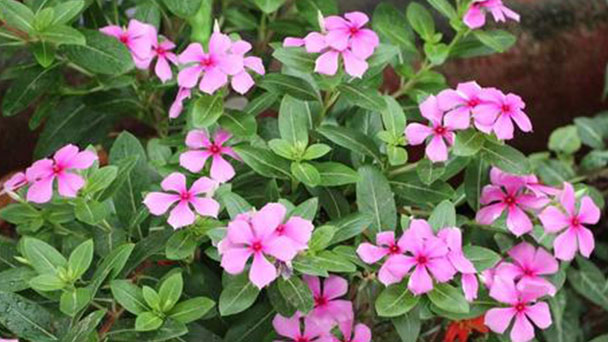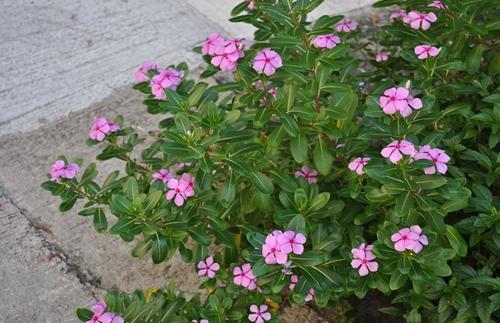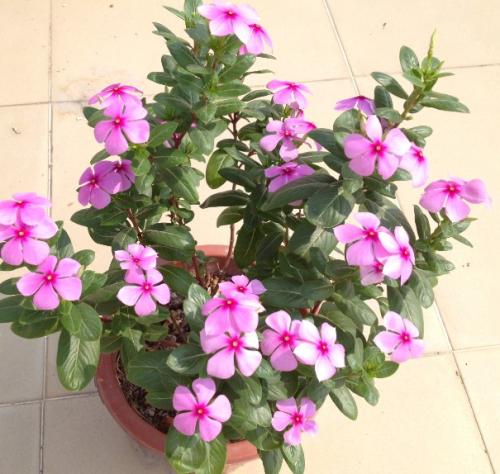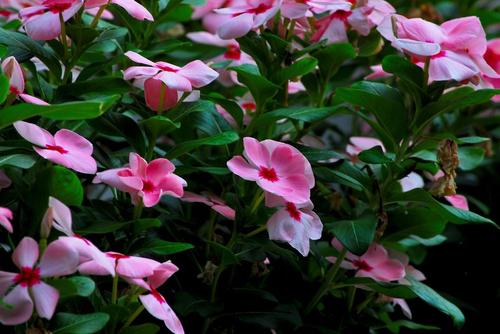Madagascar Periwinkle profile
Written by Maggie
Mar 18 2021

Madagascar Periwinkle, also known as Catharanthus roseus, bright eyes, Cape periwinkle, graveyard plant is a perennial herb. It has many flowers, long flowering periods, luxuriant flowers, from spring to autumn flowers never stop, so it has the "day spring" reputation. Madagascar Periwinkle contains more than 70 kinds of alkaloids, which is a natural medicine for the prevention and treatment of cancer. Among them, vincristine and vincristine have certain efficacy in the treatment of malignant tumors such as lung cancer, lymphoid sarcoma and childhood acute leukemia, etc., and are the most widely used anticancer plant drugs in the world.
Madagascar Periwinkle picture
Madagascar Periwinkle characteristics
Catharanthus roseus (Madagascar Periwinkle) subshrubs slightly branched, to 60 cm tall, watery, glabrous or barely hairy throughout; Stems are subsquare, striate, grayish green;Internodes 1-3.5 cm long.
Catharanthus roseus leaves are membranous, obovate-oblong, 3-4 cm long, 1.5-2.5 cm wide, apex rounded, mucronate, base broadly cuneate to cuneate, tapering into petiole; Veins are flattened on leaf surface, slightly raised on dorsum, lateral veins ca. 8 pairs.
The inflorescence is axillary or terminal, with 2-3 flowers; madagascar periwinkle calyx 5-lobed, glandular or inconspicuous on inner surface, sepals lanceolate or subulate acuminate, ca. 3 mm; The corolla is red, saltpeter-shaped, corolla tube cylindric, ca. 2.6 cm long, inner mask pubescent, throat constricted, bristle; The corolla lobes are broadly ovate, ca. 1, 5 cm long and wide; Stamens are borne on the upper part of the corolla tube, but anthers concealed within the larynx, free from stigma; The ovary and disk are identical in character with the genus.
Follicles twin, erect, parallel or slightly divergent, ca. 2.5 cm long, 3 mm in diam. The exocarp is thickly papery, striated, pilose; Seeds are black, oblong-shaped cylindrical, truncate at both ends, with granular nodules.
Madagascar Periwinkle flowering and fruit stages are almost all year round.
Madagascar Periwinkle habits
Catharanthus roseus: high temperature, high humidity, semi-shade resistance, cold resistance, the most suitable temperature is 20℃-33℃, sunshine, avoid moisture and fear of waterproofing, general soil can be cultivated, but saline-alkali soil is not suitable. Good drainage, ventilation and permeability of sandy or humus rich soil is better, flowering and fruit period almost all the year.
Madagascar Periwinkle enjoys warm, slightly dry and sunny conditions. The optimum temperature for growth is 18 ~ 24℃ from March to July, 13 ~ 18℃ from September to March of the following year, and the temperature in winter is not lower than 10℃.
Madagascar Periwinkle avoids moisture and waterproofing, basin soil watering should not be too much, too wet affect growth and development. Especially indoor winter plants should be strictly controlled watering, with dry as well, otherwise vulnerable to cold. Open cultivation, summer showers, pay attention to timely drainage, lest waterlogging caused by the whole piece of death.
Madagascar Periwinkle is a photophile plant, which must have sufficient sunlight during the growing season, glossy leaves and bright flowers.If long-term growth in the shade, leaf yellow deciduous.
Suitable for fertile and good drainage soil, barren soil, but avoid by all means alkaline. A compact, poorly ventilated clayey soil results in poor plant growth, yellow leaves, and no flowering.
Distribution range of Madagascar Periwinkle
Origin: coast of the middle sea, India, tropical America. Catharanthus roseus cultivation has a short history in China. It is mainly cultivated in the south of the Yangtze River, and is more common in Guangdong, Guangxi, Yunnan and other provinces. The provinces and cities in China have imported many Madagascar Periwinkle varieties from the world for pot cultivation and planting slot viewing.

Madagascar Periwinkle farming technology
1. Soil:
Madagascar Periwinkle likes to grow in slightly acidic loam with loose and fertile soil, good drainage and rich humus, so try to choose sandy soil with good air permeability and good drainage when selecting soil. Avoid by all means partial alkaline or rigid, poor ventilation of the clay soil, so as not to plant poor growth, resulting in yellow leaves, not flowering.
2.Adequate light:
Madagascar Periwinkle is a light-happy plant, so try to place it in light during the growing season to make its leaves lush and glossy, and its flowers and colors bright.
3. Appropriate temperature:
Madagascar Periwinkle likes to grow in a warm environment, generally 18 ~ 24℃ from March to July, and 13 ~ 18℃ from September to the following March. The temperature in winter is not lower than 10℃.
4. Reasonable watering:
Madagascar Periwinkle is afraid of waterlogging, so the watering should not be too much, generally keep dry see wet, the principle of pouring thoroughly. For example, in summer, according to the dry and wet degree of the soil surface to determine the amount of watering. In winter, we should control watering, so as not to water too much, resulting in diseases and insect pests.
5. Reasonable fertilization
Madagascar Periwinkle does not require much fertilizer, but that does not mean that there is no need for fertilizer. Compound or liquid fertilizer is usually applied in turn every ten days to ensure sufficient nutrients in the basin soil. Especially before flowering, we must apply sufficient fertilizer, in order to extend the flowering period. Fertilization, organic fertilizer as the main, compound fertilizer as a supplement, and every month topdressing once, in order to ensure adequate soil nutrients.
6. Pest control
During the growth of Catharanthus roseus, diseases and insect pests will occur due to various factors such as poor management, common seedling cataplash disease, gray mildew, etc.. So it is necessary to strengthen the management of water and fertilizer at the seedling stage to effectively prevent and control diseases and insect pests.
Application value of Madagascar Periwinkle
Madagascar Periwinkle not only has beautiful posture and long flowering period, which is suitable for layout of flower beds, flower borders, but also can be used as pot plants for appreciation. It is also a kind of medicine against cancer. According to modern scientific research, Madagascar Periwinkle contains 55 species of alkaloids. Among them, vincristine and vincristine have certain efficacy in the treatment of malignant tumors such as choriocarcinoma, lymphoid sarcoma and acute leukemia in children, and are the most widely used anticancer plant drugs in the world at present.
Madagascar Periwinkle flower language
Madagascar Periwinkle, large and gorgeous flowers always remind people of good things. So Madagascar Periwinkle's observations are pleasant memories.

Latest Updated
- Benefits of Bugleweed - 7 Science-backed Health Benefits
- Bugleweed Dangers & Side Effects - Is It Poisonous?
- How to Plant Evergreen Trees - What You Should Know
- When to Plant Evergreens - Grow Guide for Evergreen Trees
- 12 Wonderful Evergreen Shrubs for Your Garden
- 12 Popular Evergreen Plants with Pictures for Beginners
- When And How To Prune A Lilac Bush Like a Pro
- How to Grow & Care for Lilac Vine (Hardenbergia Violacea)
- Japanese Lilac Tree (Syringa Reticulata) Care & Propagation Guide
- Shumard Oak Pros and Cons - What to Know
Popular Articles
- Winter maintenance of Antirrhinum Majus
- How to Grow Terminalia Mantaly Tree
- How to Grow and Care for Crossostephium Chinense
- How to grow Antirrhinum Majus in spring
- Peristeria Elata (Dove Orchid) Profile: Info & Care Guide
- Underwatered Snake Plant (Sansevieria Trifasciata) - Signs And How To Fix
- How to Care for Brazilian Jasmine Plant (Mandevilla Sanderi)
- How to Grow & Care for Graptopetalum Purple Delight in Summer
- Rosa Chinensis (China Rose): Plant Growing & Care Tips
- How to Care for Baby Sun Rose (Aptenia Cordifolia)
